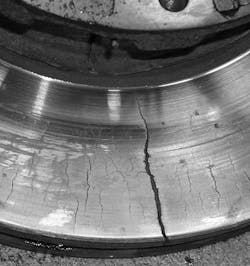Servicing air disc brakes? Bendix recommends choosing OE-qualified replacement pads
Fleets select air disc brakes for the distinct advantages they provide, chief among them greater braking power and shorter stopping distances. Recent testing completed by Bendix Spicer Foundation Brake LLC (BSFB) indicates that fleets wishing to maintain those advantages should service air disc brakes (ADB) with like-for-like OE pads, versus a range of aftermarket replacement pads available on the market today.
The testing showed that like-for-like OE replacement pads – unlike aftermarket brands – allow fleets to sustain shorter stopping distances; continue consistent braking performance; prevent damage to other high-cost replacement components, such as rotors; ensure that vehicles stay safely parked; and realize maximum return on investment from their air disc brakes.
“The goal of our testing is to help fleet operators, distributors, and owner-operators who equip their vehicles with air disc brakes to make informed service decisions. Air disc brakes are the most advanced braking technology available, and one key to maintaining their high level of safety and performance is replacement pad selection,” said Keith McComsey, director, marketing and customer solutions at BSFB. “Choosing inferior pads diminishes the brakes’ capabilities and undercuts the investment made in air disc brakes. Our testing and analysis make it clear that aftermarket replacement pads will cost fleets out on the road and in their bottom line.”
BSFB conducted testing using the Bendix ADB22X air disc brake outfitted with Bendix ADB replacement pads and several air disc brake replacement pads available in the aftermarket. The consequences of installing non-OE replacement pads fall into three categories.
Stopping Distance
Vehicles equipped with Bendix replacement pads had a stopping distance of 198 feet. All three aftermarket pads tested exceeded the stopping distance of Bendix pads, from 31 feet up to 56 feet, which is approximately the length of a trailer in additional stopping distance.
“The testing helps quantify the drop-off in torque and stopping ability, demonstrating the likelihood that trucks will not get typical air disc brake stopping distances with inferior replacement pads,” said Nicole Oreskovic, product director, Air Disc Brakes. “In fact, stopping distances may exceed those of RSD (Reduced Stopping Distance) drum brakes. Fleets that invested in ADB stopping distance performance would now get RSD drum brake performance – or worse – with these options, diminishing some of the most valuable qualities of air disc brakes.”
Drivers, McComsey noted, must also be prepared for this difference in stopping distance.
Impact on the Brake System
The aftermarket pads tested also ran hotter. This can lead to swelling and brake drag, as well as accelerated pad wear – and even disintegration – which causes diminished braking ability. The result is shorter service life and higher labor and replacement costs.
Aftermarket replacement pads also are not typically treated for corrosion resistance, making them susceptible to corrosion and crumbling after exposure to road contaminants, reducing their service life even further.
In addition, pads that are unable to manage heat consistently run the risk of damaging brake components. Aftermarket replacement pads may create heat cracks in the rotor, requiring replacement and labor costs.
“In this instance, a fleet operator may think they’re saving $200 on replacement pads, when they may actually see an expense of $3,000 for components, labor, and vehicle downtime,” McComsey said.
“Also, in the case of the Bendix® ADB22X™ air disc brake, choosing aftermarket pads voids the product’s five-year warranty,” Oreskovic adds. “The Bendix brake is designed with an optimized pairing of friction and rotor. Since typical aftermarket replacement pads are not engineered to operate in perfect synchronicity with the ADB22X unit, they cannot deliver the same benefits as Bendix® ADB replacement pads.”
Parking Weight Limit
Parking weight limit was another category in which aftermarket replacement pads didn’t perform as well as the Bendix ADB replacement pads.
While the Bendix replacement pads tested exceeded the FMVSS-121 requirement for inclined parking, the aftermarket pads tested demonstrated substantially less ability – down to only 50 percent of the FVMSS-121 requirement – to keep a tractor-trailer combination parked with some amount of load. With those aftermarket pads, fleets would have to significantly reduce their payload weight – or even be empty – to park safely.
“Fleets may not be fully aware of the serious consequences of these inferior aftermarket products,” McComsey said. “With these pads, they’ll almost certainly experience safety and performance issues, reduced service life, and a higher total cost of ownership. To protect the investment they’ve made in their air disc brakes, they should choose like-for-like OE replacement pads.”


